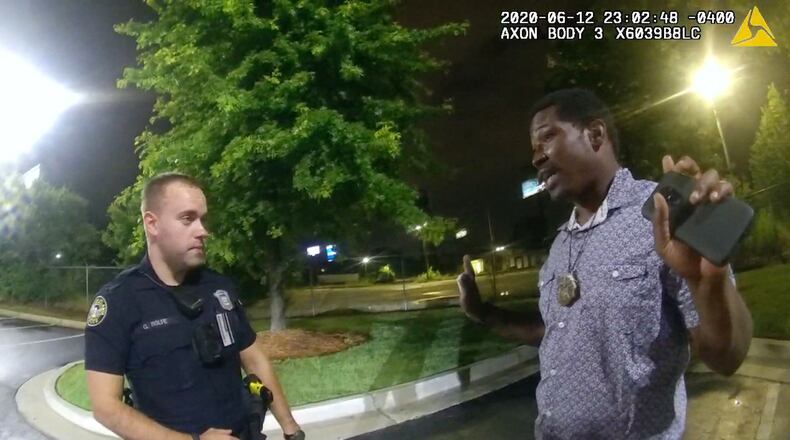On June 12, a man passed out behind the wheel while waiting in the drive-thru at a Wendy’s on University Avenue. Within an hour he’d be dead, shot multiple times by an Atlanta police officer after he scuffled with officers, striking one and grabbing a Taser from the other.
By the next day, Rayshard Brooks’ name was everywhere. His shooting exacerbated tensions over police use of force that had roiled Atlanta and cities across the nation following the Memorial Day death of George Floyd at the hands of Minneapolis law enforcement. Brooks, in death, became part of that movement.
Officers talked with Brooks for more than 40 minutes before administering a breathalyzer test, the results of which showed he was above the legal limit by 35%.
“I think you’ve had too much to drink to be driving,” said Officer Garrett Rolfe; the encounter was captured on body camera footage. “Put your hands behind your back for me.”
A scuffle ensued. Brooks took a Taser from Officer Devin Brosnan, struck Rolfe, then fired the Taser, apparently missing Rolfe. Rolfe fired his gun, striking Brooks twice.
Rolfe was promptly fired from the department and then-Fulton County District Attorney Paul Howard swiftly announced felony murder and other charges. Brosnan was charged with aggravated assault.
Hundreds of Atlanta police officers protested with an unofficial “blue flu” and officer retention remains an issue. Mayor Keisha Lance Bottoms has promised a thorough review of department training and culture.
Brooks was one of three men killed in 2020 following a confrontation with Atlanta police. Officers were involved in three other lethal shootings but it’s not yet clear whether they fired the fatal bullets, according to the GBI, which investigates almost all police shootings in the state.
As of Dec. 23, 2020, the GBI had investigated 96 shootings involving officers statewide — 12 more than in 2019.
William Simpkins, also known as El Shaddai Simpkins, was killed on March 17 after a shootout with police in Midtown. According to the GBI, after officers attempted to talk with him and he fired at them, Simpkins ran to the intersection of Piedmont Avenue and S. Prado, where APD officers again fired their weapons, striking Simpkins. He died following transport to Grady Memorial Hospital.
Simpkins, 39, originally from South Carolina, was survived by his parents, three brothers and two sisters.
Dearian Bell, 28, died on Sept. 21 after police responded to a domestic disturbance call in southeast Atlanta. Bell had exited a vehicle, where his wife remained, holding a firearm, according to the GBI. His wife told police the gun was hers and wasn’t loaded. Bell told them otherwise, ignoring commands to disarm. Police attempted at length to calm him and have him turn over the gun before he threw a bicycle in the direction of an officer, who then shot him. Bell died at Grady.
Bell had suffered from schizophrenia since age 16, according to his mother, Catina Williams. She told The Atlanta Journal-Constitution she believes her son, whom she called “D,” meant no harm and was acting out because he needed help. She also said she was not angry at the officer.
Williams said her son could always make her laugh, recalling the time he took $20 to jump into a freezing pool full of algae sludge. He would don a wig to impersonate her, she said.
But he’d struggled. He went to prison as a teenager, convicted in a burglary and theft case, his mother told the AJC. He aspired to be more like his siblings, all of whom were thriving, Williams said. Before his death, Bell had applied to a trade school.
Brooks, a 27-year-old father of three daughters and one stepson, was also looking to better himself. But redemption isn’t easy with a criminal record, he said in an interview with Reconnect, which seeks to end mass incarceration.
“You go to filling out your application and you get to this question, ‘Have you ever been convicted of a crime or have you ever been arrested?’” Brooks told Reconnect a few months before he died. “Then you finish up the application and you have some employers that come back to you: ‘Well, Mr. Brooks, unfortunately we can’t hire you due to the fact that you’ve been incarcerated or you’ve been, you know, arrested for this and that.’”
Brooks served one year in prison for a 2014 incident in which he yanked his wife against her will into another room in front of her son. Brooks pleaded guilty to false imprisonment and, because the boy saw the fight, child cruelty.
“I’m trying, you know, I’m not the type of person to give up,” he said. “You know, and I’m gonna keep going until I make it to where I want to be.”
About the Author
The Latest
Featured




